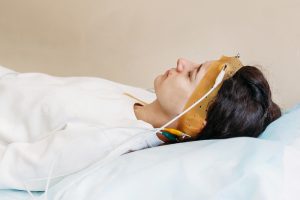Deep sleep is crucial for memory consolidation. Several sleep disturbances have been observed in people with mild cognitive impairment. Among the most pronounced changes is a reduction in the amount of time spent in the deepest phase of sleep. Research from Northwestern University suggests that gentle sound stimulation during deep sleep improves deep sleep in people with mild cognitive impairment who are at risk for Alzheimer’s disease. Those whose brains responded most strongly to sound stimulation showed improved memory performance the next day.
The Effects of Sound Stimulation on the Brain
There is a great need for new targets for the treatment of mild cognitive impairment and Alzheimer’s disease. Northwestern scientists had previously shown in a 2017 study that sound stimulation improves memory in older adults. Because the newer study was small – nine participants – and some people responded more than others, the improvement in memory was not considered statistically significant. However, there was a significant correlation between the improvement in deep sleep through sound and memory performance: the greater the improvement in deep sleep, the better the memory performance. These results suggest that improving sleep is a promising new approach to preventing dementia.
For the study, scientists from Northwestern University conducted a study with nocturnal sound stimulation in people with mild cognitive impairment. The participants spent one night in the sleep lab and another night there about a week later. Each participant received sounds on one of the nights and none on the other night. The order of the nights with and without sounds was randomized. The participants completed memory tests the night before and again in the morning. The scientists then compared the difference in slow-wave sleep with and without sound stimulation and the change in memory on both nights for each participant. The test subjects were tested on their ability to remember 44 pairs of words.
Those people whose slow wave activity increased by 20% or more after the sound stimulation remembered about two more words in the memory test the next morning. A person with a 40% increase in slow wave activity remembered nine more words. The sound stimulation consisted of short pulses of pink noise, similar to white noise, but deeper during the slow waves. The system monitored the participants’ brain activity. When the person was asleep and slow brain waves were observed, the system emitted the sounds. When the patient woke up, the sounds were no longer played.The results deepen the understanding of the importance of sleep for memory, even when memory loss is present, and suggest that slow-wave or deep sleep is a viable and potentially important therapeutic target in people with mild cognitive impairment. The technology can be adapted for home use.
Electrical Stimulation During Sleep Can Improve Memory
While it’s well known that sleep plays a critical role in strengthening memory, scientists are still trying to decipher how this process occurs in the brain overnight. Research led by scientists at UCLA Health and Tel Aviv University shows that targeted stimulation of the deep brain during a critical time in the sleep cycle appears to improve memory consolidation.
The researchers developed a closed-loop real-time system for this electrical stimulation. The system “listened” to the brain’s electrical signals, and when the patients fell into the deep sleep phase associated with memory consolidation, it emitted gentle electrical pulses that instructed the rapid-firing neurons to “play” in synchrony. The results showed that all subjects performed better on memory tests after a night of electrical stimulation than after a night of undisturbed sleep. Key electrophysiological markers also indicated that information flows between the hippocampus and the entire cortex, physically underpinning memory consolidation.








